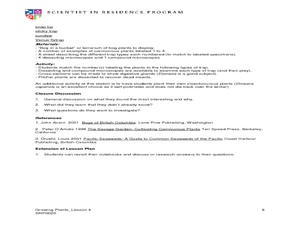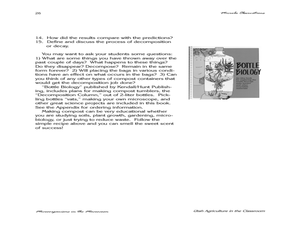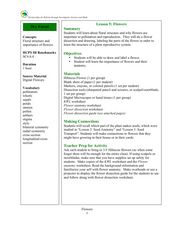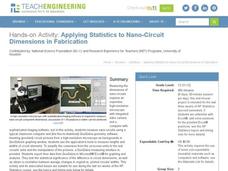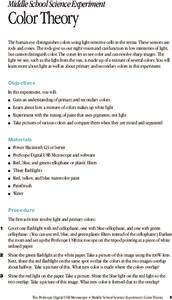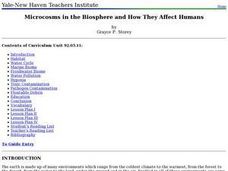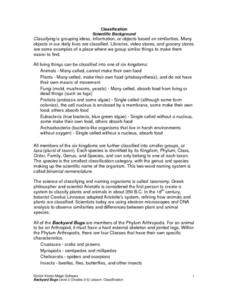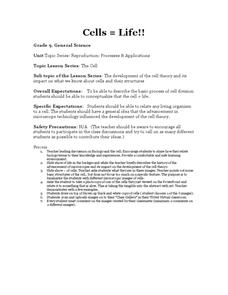Curated OER
Microscopy Exercises
Students explore organisms and botany by utilizing microscopes. In this microscopic research lesson, students define many plant and organism related vocabulary terms such as conifers, moss and spores. Students view spores and other...
Curated OER
Exploring Food with Senses
Students explore properties of fruits and vegetables using their five senses. For this sensory activity lesson, students study fruit and vegetables through a microscope, using their sense of touch as they are blindfolded, and with their...
Curated OER
DNA Extraction
Students explore biology by participating in a fun science experiment. In this DNA lesson, students discuss what DNA is and where it comes from. Students utilize two bananas, a blender and a microscope to view the DNA of a banana in class.
Curated OER
Rotten Truth
Pupils complete activities to study decomposition. For this decomposition lesson, students work in pairs to observe a decay buffet experiment. Pupils keep compost bag journals. Students define and discuss the process of decomposition.
Curated OER
Dry Forest: Flowers
Pupils explore botany by examining diagrams. In this plant reproduction lesson plan, students define a list of plant vocabulary terms and identify plant anatomy from a diagram. Pupils complete several plant activity worksheets and study...
Curated OER
Stomata: Microscopic Openings that Let Plants Breathe
Young scholars participate in a lab experiment to observe and measure the opening and closing of stomata. They focus on photoperiod, locate and identify stomata on a leaf and explain the role of stomata in the daily functioning of a plant.
Teach Engineering
Applying Statistics to Nano-Circuit Dimensions in Fabrication
Do flexible circuits change dimensions during fabrication? Groups use GeoGebra software to measure the length of pictures of flexible nano-circuits. To determine if the circuits change dimensions, future engineers use Microsoft...
Curated OER
Color Theory
Students are able to gain an understanding of primary and secondary colors. They are able to explore about how a mixture of colors makes up white light. Students are able to experiment with the mixing of paint that uses pigments, not...
Teach Engineering
Inside the DNA
Get your class to take a closer look at DNA. Pupils conduct research to determine the methods used by scientists to analyze the molecular structure of DNA. The class members investigate different types of molecular imaging along with gel...
Teach Engineering
Glowing Flowers
What a bright idea! Young scientists conduct an experiment on flowers to finish the last of a six-lesson unit on Cells. Putting the stems into dye-injected water and leaving it overnight results in flowers that glow. This is to simulate...
Curated OER
Fiber Identification
Lab sheets for three different crime scene investigation activities are tucked into this resource. In the first activity, inquisitors examine a variety of fibers, including the fiber found at "the crime scene," under ultraviolet light....
Curated OER
Comparing the Amoeba to Paramecium
This laboratory activity is valuable practice in comparing features of different organisms. You could use it to introduce junior biologists to protozoans. The materials and procudures for the learners are simple, and analysis...
Curated OER
Science: Microcosms in the Biosphere
In a series of lessons, examine the impact on humans by microcosms in the biosphere. Among the plans structured for students with different abilities and learning styles, are activities describing the symbiotic relationship, drawing the...
Nuffield Foundation
A Closer Look at Blood
Here is a lab that has teenage scientists examining samples of their own blood under a microscope. Learners carefully prepare slides, then make detailed observations and identifying different types of cells using a key.
Curated OER
The Global Precipitation Measurement Mission (GPM) Lesson
Introduce your class to one of the ways that technology is benefiting humanity. The Global Precipitation Measurement Mission involves the data collected by nine satellites from different countries with a united focus on studying world...
Nuffield Foundation
Dissecting Lungs
Here is a lab activity where teens experience the respiratory system first-hand as they dissect lungs and identify key structures within the system. Although the website is written in British English with some slightly different verbiage...
Curated OER
Invasives and Macroinvertebrates
Students view macroinvertebrates, or discuss previous collection activity. They graph data on macroinvertebrates in the Hudson River. Students discuss the relationship between habitat, environmental changes, and invertebrate diversity or...
Curated OER
Backyard Bugs
Explore the concept of scientific classification and the similarities and differences between plant and animal species. Your class will participate in hands-on activities by investigating dichotomous keys and classifying their shoes. To...
Curated OER
Student Exploration: 3D Eclipse
In this eclipse worksheet, students complete a hands on activity where they simulate an eclipse and answer short answer questions about it. Students complete 19 questions.
Curated OER
Cells=Life!
Ninth graders share what they know about cells. In this biology lesson, 9th graders study different microscopic images of the cell. They draw one and explain to their partner why they chose that image.
Curated OER
Activities of the Immune System (Activity 1)
Students cut an apple in half and cover half with plastic wrap. They place drops of liquid on each half and discover how our skin protects us. They answer discussion questions to end the lesson.
Curated OER
Norman Suburban Activity
Students analyze the factors affecting organisms in the pond ecosystem. In this environmental science lesson, students perform an experiment to determine pH, nutrients and temperature of different pond sites. They present their result to...
Science 4 Inquiry
Plant Structures Lab Stations
In China, hibiscus is known as the shoe flower because it is used to polish shoes, while in Hawaii, it is honored as the state flower. Young scientists learn about the structure and function of flowers. They dissect hibiscus...
NOAA
Mud is Mud...or is it?
We know that the type of soil varies by location, but does the seafloor sediment also vary, or is it all the same? Scholars compare photos of the seafloor from two different locations: the Savannah Scarp and the Charleston Bump. Through...
